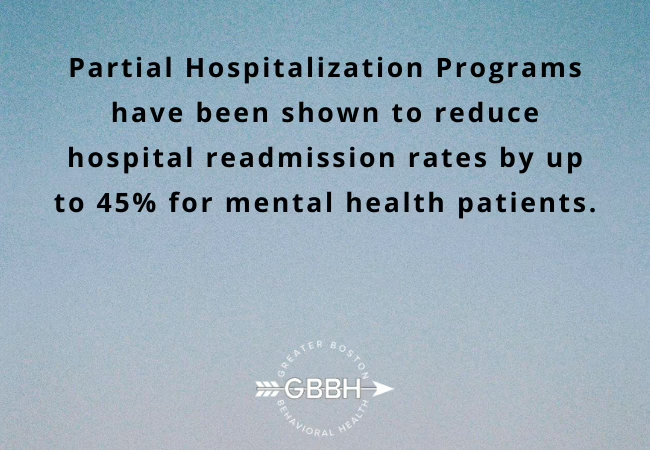When you’re struggling with mental health challenges—whether it’s persistent anxiety, overwhelming depression, trauma, or intense emotional dysregulation—getting the right level of support is critical to your recovery. But many individuals and families feel uncertain when deciding between a Partial Hospitalization Program (PHP) and Inpatient Treatment.
So, how do you know which one is right for you?
At Greater Boston Behavioral Health, we offer a full continuum of care, including both Partial Hospitalization Program in Boston and Inpatient Treatment Program in Boston, along with comprehensive services such as Cognitive Behavioral Therapy Boston, trauma-informed care, psychiatric services, and specialized Anger Management Therapy in Boston. In this article, we’ll help you understand the key differences between PHP and inpatient treatment—and guide you toward the most appropriate option based on your symptoms, lifestyle, and clinical needs.
Understanding PHP and Inpatient Treatment: A Quick Overview
What Is Inpatient Treatment?
Inpatient mental health treatment refers to 24/7, hospital-based care where individuals live at the treatment facility during the course of care. It’s designed for individuals who need stabilization due to:
- Acute psychiatric symptoms
- Suicidal thoughts or self-harming behavior
- Danger to self or others
- Inability to function in everyday settings
Patients receive round-the-clock supervision, daily psychiatric evaluation, intensive therapy, medication management, and crisis intervention.
What Is a Partial Hospitalization Program (PHP)?
Partial Hospitalization Programs (PHPs) offer intensive mental health care during the day, usually 5 days a week for 4–6 hours each day, but allow clients to return home in the evenings. PHP is ideal for those who need more support than outpatient therapy but don’t require 24/7 supervision.
PHP services often include:
- Group and individual therapy
- Medication management
- Psychiatric evaluation
- Psychoeducation
- Structured support and skill-building
At Greater Boston Behavioral Health, PHP is a vital part of our Mental Health Programs in Boston, particularly for individuals stepping down from inpatient care or those who need structure without hospitalization.
Key Differences Between PHP and Inpatient Treatment
| Category | Inpatient Treatment Program | Partial Hospitalization Program (PHP) |
|---|---|---|
| Level of Supervision | 24/7 medical and psychiatric care | Daytime clinical support only |
| Living Situation | Onsite, residential stay | Return home each evening |
| Duration | Typically 5–14 days (crisis stabilization) | Typically 2–6 weeks (based on progress) |
| Focus | Immediate safety and stabilization | Skill-building, therapy, and continued progress |
| Best For | Psychiatric crises or safety concerns | Moderate-to-severe symptoms without current safety risks |
| Flexibility | Less flexible—requires time away from home/work | More flexible—can maintain some responsibilities |
When Inpatient Treatment Is the Best Choice
Inpatient treatment may be right for you if:
- You are in immediate danger of harming yourself or others
- You are experiencing suicidal thoughts or have made an attempt
- You are experiencing psychosis, mania, or delusions
- You’ve stopped functioning in daily life (not eating, sleeping, or leaving bed)
- You are at risk of relapse in substance use due to mental health triggers
- You require medical monitoring for medication adjustment
At our Inpatient Treatment Program in Boston, clients receive continuous care in a structured, secure environment to address the most acute symptoms. Once stable, many transition to our Partial Hospitalization Program in Boston or Intensive Outpatient Program in Boston (IOP) for continued support.
When PHP Is the Best Choice
PHP may be right for you if:
- You’ve just been discharged from inpatient care and still need support
- You’re experiencing depression, anxiety, trauma, or emotional instability
- You can safely live at home but need structured therapy during the day
- You’re struggling with emotional regulation or interpersonal conflict
- You need to rebuild daily functioning but aren’t in a current crisis
Our Partial Hospitalization Program in Boston provides a therapeutic setting that includes group therapy, individual counseling, psychiatric evaluations, and skills training. It’s particularly effective for clients dealing with:
- Mood disorders (depression, bipolar disorder)
- PTSD and trauma symptoms
- Borderline personality disorder
- Anger management challenges
- Dual diagnosis (mental health + substance use)
What Therapies Are Used in Both PHP and Inpatient Care?
At Greater Boston Behavioral Health, both PHP and inpatient programs incorporate a full range of evidence-based and holistic therapies, including:
- Cognitive Behavioral Therapy (CBT) – Restructures negative thinking patterns
- Dialectical Behavior Therapy (DBT) – Enhances emotional regulation and distress tolerance
- Trauma-Informed Therapy – Helps clients process unresolved trauma
- Mindfulness and Stress Management – Calms the nervous system and reduces reactivity
- Group Therapy – Builds support and accountability through shared experience
- Family Therapy – Helps repair relationships and strengthen communication
- Psychiatric Care in Boston – Medication management and psychiatric evaluation
These therapies are integrated into our Mental Therapy Programs in Boston, personalized to each client’s diagnosis, needs, and progress.

Which Option Offers More Long-Term Results?
Inpatient treatment is crucial for immediate safety and stabilization, but is typically short-term. The real work of building coping skills and creating behavioral change often happens during or after PHP, IOP, or outpatient therapy.
PHP provides continuity of care, giving clients the structure and consistency needed to make sustainable progress. Many clients transition from inpatient to PHP and then into IOP, forming a step-down continuum of care that supports long-term healing.
This tiered approach is especially beneficial for individuals working on:
- Anger management issues
- Trauma recovery
- Relationship repair
- Relapse prevention
- Emotional regulation
What If You’re Still Not Sure Which You Need?
That’s completely okay. Choosing between inpatient care and PHP can feel overwhelming. Our clinical team at Greater Boston Behavioral Health is here to help you make the right choice.
We provide:
- Comprehensive psychiatric evaluations
- Personalized treatment plans
- Seamless transitions between levels of care
- Family consultation and support
- Insurance and admissions guidance
You don’t have to figure it out alone—we’ll walk with you every step of the way.
Take the Next Step Toward Healing
Whether you’re navigating a mental health crisis or simply need more support than weekly therapy, help is available—and effective. At Greater Boston Behavioral Health, we offer both inpatient care and Partial Hospitalization Programs in Boston, along with a full suite of Mental Health Programs designed to support you from crisis through long-term recovery.
Call us today at (888) 278-0716 to learn more and schedule a confidential assessment. Let’s build a treatment path that meets your needs and honors your journey—wherever you’re starting from.
FAQ on PHP vs. Inpatient Mental Health Treatment
What’s the difference between PHP and inpatient treatment?
Inpatient treatment involves 24/7 care in a residential setting, typically for crisis stabilization. PHP provides intensive daytime treatment while allowing clients to return home in the evening.
Who qualifies for inpatient mental health care?
Inpatient care is best for individuals experiencing a psychiatric crisis, suicidal thoughts, self-harm, or psychosis—situations that require constant supervision and medical support.
Is PHP a step down from inpatient care?
Yes. Many people transition from inpatient treatment into PHP for continued structure and support as they stabilize and prepare to reintegrate into daily life.
Can PHP treat serious mental health conditions?
Absolutely. PHP is designed for individuals dealing with moderate to severe anxiety, depression, bipolar disorder, PTSD, and more. It offers intensive therapy without 24/7 hospitalization.
How do I know which level of care is right for me?
The best way is to undergo a professional assessment. Greater Boston Behavioral Health offers evaluations to determine if PHP, inpatient, or another program is most appropriate.

